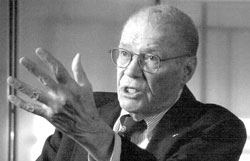Don’t watch The Fog of War (which opens Friday, Feb. 6, at the Guild 45) because it’s good for you, like spinach. Errol Morris’ portrait of Robert McNamara—the man behind the scenes for the World War II firebombing of Tokyo, Ford Motor Co. in the ’50s, the Cuban missile crisis, and the Department of Defense during Vietnam—works as dessert, too. It’s a cinematic delicacy quite apart from its status as the most explosively important and politically topical meat-and-potatoes film of the new year. (No surprise that it got an Oscar nom, having already opened in L.A. and New York.) Morris, a former private investigator, is the anti–Michael Moore: Instead of telling you what to think and making himself the star, he puts his interview subject in the limelight and stays out of the picture. His “Interrotron” camera superimposes his face on the lens, so that his interviewees are looking right at him, as he asks exceptionally well-informed questions.
Morris brilliantly illustrates what the subjects say: In his riveting 1988 true-murder mystery The Thin Blue Line, a slo-mo milk shake spins in the air with the impact of the spaceship in Kubrick’s 2001. Here, he dramatizes McNamara’s words about the firestorm that vaporized at least half the populations of 67 Japanese cities by having their place names morph into those of American towns with like populations. The ominously droning music of his preferred composer, Philip Glass, intensifies an effect of inhuman mechanism—the idea of war Tolkien wrote his Ring trilogy to oppose.
Scarcely airing a word of his own, Morris makes Fog pure, eloquent cinema. When McNamara talks about his early, lifesaving work forcing Ford to make cars safer, Morris replicates McNamara’s crash-impact experiments using skulls dropped down a Cornell dorm stairwell. They stand not just for the thousands who lived, but also the millions who died, thanks to what went on in McNamara’s Harvard M.B.A. head. Throughout the film, images of falling objects symbolize pitiless fate, which McNamara fears and indefatigably defies. He very nearly helped launch nuclear war three times, only to be rescued by what he terms “luck.”
Many have remarked that McNamara, now 87, resembles Gollum, but that’s way off. Gollum is all about schizophrenic self-doubt, the war between one’s passionate worst and rational better selves. McNamara owns up to no such duality, admits to no moral error on his part or any president’s—even while he’s giving better evidence against their policies, past and present, than any prosecutor could. Looking straight at us, he says his Japan-bombing work with Gen. Curtis Le May (the reputed model for Dr. Strangelove‘s Buck Turgidson) would have gotten them convicted as war criminals had we lost the war.
Yet McNamara does have emotions that betray his true allegiances. Fascinatingly, he says that the stress of his work as secretary of defense was so hard on his family that it “probably” caused his wife to die young. Later, he smiles and insists it was all great for his family. (At last fall’s Telluride Film Festival, Morris told me this, for him, is the weirdest moment in the movie.) Then he tears up at the memory of selecting JFK’s grave site and showing it to Jackie. For him, presidential ties trump family ties.
That’s why he remained loyal to LBJ during Vietnam, which remains McNamara’s crucial experience. (Back when I thought I might be about to die in it, it was known as “McNamara’s War.”) However, Morris airs startling secret tapes suggesting that McNamara actually advised JFK to pull out of Vietnam only 51 days before his assassination, and that LBJ was the real hawk afterward. This remains controversial, as does McNamara’s Fog testimony about the Gulf of Tonkin incident, whereby LBJ conned America—if not McNamara—into a wider war.
But the film makes clear the enduring lessons McNamara drew from Vietnam: Americans can’t empathize with foreigners and thus failed to see that Vietnamese viewed their conflict as their own civil war, not a Cold War battlefield. “The American people are unilateralist,” he said at Telluride. “Unilateralism [is] one of the main problems facing the nation today—and I don’t mean Bush, I mean the nation.”
Yet McNamara has never breathed a word against any of his masters, and he still refuses to acknowledge the shrieking relevance of his Vietnam experience to what’s happening in Iraq. That relevance is, as New Yorker writer Mark Danner said while introducing McNamara at Telluride, “an unspoken question mark hanging over the film.”
So we have McNamara preaching against the nuclear threat; against pre-emptive war based on preposterous ideology in faraway places of which we are ignorant; against defying the will of the rest of the world in our own insanely self-destructive hubris; against any unilateral war. But he stubbornly refuses to criticize the current Texan attempting to sear the globe with the U.S. brand, whose lies about weapons of mass destruction precisely parallel the falsely spun Tonkin incident.
“It’s irresponsible for an ex–secretary of defense to comment critically on a president elected constitutionally, when tens of thousands of Americans are risking their lives,” McNamara told The San Francisco Chronicle last week. Oh, yeah—how about a president not elected constitutionally? And how about applying what he said next: “If [the U.S.] cannot persuade countries with similar values and interests the merit of our course, we ought to reconsider and probably turn away from it. We had not one single major ally in Vietnam. Not Britain, France, Germany, or Japan.”
Maybe McNamara is Gollum after all, a Gollum bereft of self-knowledge. And what is his Precious? That mesmerizing power that can destroy the world if only we yield to it: a corrupted presidency.








